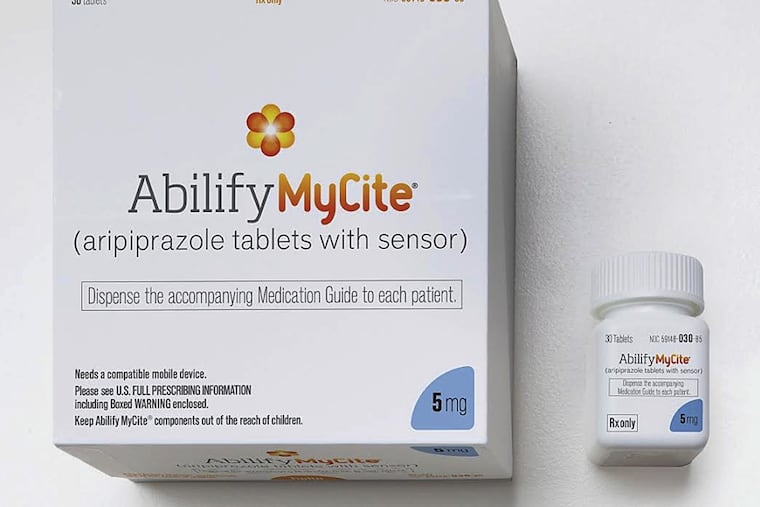Why the first, FDA-approved pill with a sensor will be controversial
The first digital pill offers a new way to monitor patients, but also raises privacy concerns.

The first drug with a sensor embedded in a pill that alerts doctors when patients have taken their medications has been given a thumbs-up by the Food and Drug Administration, and it will likely raise a host of issues involving privacy, cost, and whether patients really want caregivers looking over their shoulders.
The digital pill approved late Monday allows Japan's Otsuka Pharmaceutical Co. to insert a tiny chip — the size of a grain of sand — inside the psychiatric medication Abilify used to treat schizophrenia and other serious mental illness.
The technology is a breakthrough in allowing others to see whether patients are taking their medicines as prescribed, but also raises privacy concerns. Forty percent to 45 percent of people with common cardiovascular and other chronic diseases such as diabetes do not take their medications as prescribed.
"That's a big deal because medication non-adherence is a huge public-health challenge in the United States," said Kevin Volpp, a physician and director of the University of Pennsylvania's Center for Health Incentives and Behavioral Economics.
The tablet, Abilify MyCite, contains a digital sensor that is activated by stomach fluids, sending a signal to a patch worn by the patient, which, in turn, notifies a smartphone app that the medication has been taken. The information can be shared with physicians and others with the goal of keeping doctors more informed in making treatment decisions.
But the pill is not magic. People still have to take it, and the skin patch has to be replaced every seven days.
The technology is likely to be controversial. "There's an open question of how paternalistic do we want our health-care providers to be," Volpp said. "Many patients, for whatever reasons, may decide, 'I don't want to take the medicine.' Having their provider, or health plan, monitor closely whether they are taking the medicines on a daily basis may be uncomfortable to some patients."
Niteesh Choudhry, a physician at Brigham & Women's Hospital in Boston and a professor at Harvard Medical School, said, "This is a technological feat. There's a lot to be celebrated here from a purely technological perspective. That said, there are a ton of unknowns."
First, will the technological monitoring be reliable, and will the data improve patients' taking their medications? "We really don't know anything about that yet," Choudhry said.
Ultimately, will patients feel better, be hospitalized less often, and function better. "Those clinical outcomes, some of which are very patient-centric, need to ultimately be established," Choudhry said.
The technology raises a medical ethics issue: What will the information collected from the devices be used for?
The problem of people not taking their medications is "a normal human behavior, like not exercising, or following a diet," Choudhry said. "For some patients, this technology will almost certainly be helpful and useful. But it may not be applicable for all patients, nor for all conditions."
The new pill will likely cost more than the existing Abilify, or generic versions. "So there's a trade-off between the advantages that a new technology like this one offers, and the cost that is added because we have to pay for the technology," he said.
Otsuka America Pharmaceuticals plans to roll out the treatment to a select number of health plans and providers, who will identify a "limited" number of adults with schizophrenia, bipolar disorder, or major depressive disorder who may benefit. Patients can choose not to share some information, or opt out at any time, the companies said.
Ken Duckworth, medical director for the National Alliance on Mental Illness, called the new pill "a tool that we don't know how to use yet. But it has the potential, if a person wants to communicate information to a family member, or their doctor, that they are taking their medicine.
"Sometimes people with schizophrenia spend a lot of time convincing people that they are actually taking the medicine. This is one way to accomplish that," said Duckworth, who grew up in Glenolden and graduated from Temple University Medical School.
"It might also help doctors answer the question: 'Was this medicine successful?' One question with all medications, not just medication for schizophrenia, is did this person take the medicine?" he said. "It's important because if the person didn't take the medicine, it's hard to conclude that it was a failed treatment. But if he took the medicine, and continued to have symptoms, then you can make a change in the regimen."
If the technology is commercially successful, Penn's Volpp predicted that "there will be a lot of other companies working on this."
"I think there are some clear clinical applications here. It will be interesting to see how this unfolds and whether this gets extended to other types of medications," Volpp said.